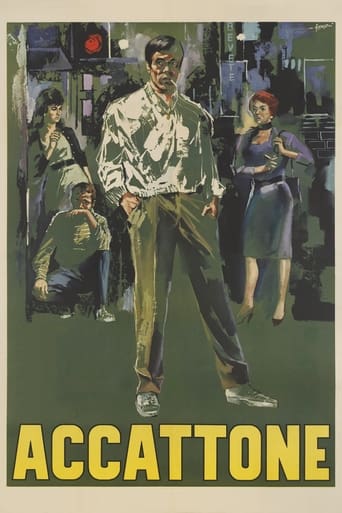darnthatdream
Basically everyone is so desperate, brutal and cynical in this film. Felt like biteing the bullet.
tomgillespie2002
The term 'accattone' is an old Italian phrase intended to brand a character with an aura of absolute repulsiveness. Thieves and low-lives would usually coin the term when referring to a character that is so despicable, so without moral or social decency, that even the criminals would look down upon them. In Pier Paolo Pasolini's incredibly assured debut, 'Accattone' is Vittorio (Franco Citti), a low-life pimp who when he is not sitting around squeezing money out of people with wagers and tricks, is abusing his lone prostitute who cannot work after breaking her leg in a motorcycle accident. It's a tale of a despicable scumbag, set during a dark period in Rome, where men viewed working as slave labour, and enjoyed themselves by beating prostitutes to within an inch of their life.It's an incredibly bleak tale, told without sentiment and moral preaching. Pasolini's doesn't seem to want to dictate a larger social message, or make Accattone a sympathetic character who is the victim of political or social oppression, but to simply tell a tale, a real tale, of a group of low-lives who are the way they are because they want to be. After all, the true soul of neo-realism is to portray life the way actual people experience it, not to romanticise or sentimentalise it with the kind of scripts Hollywood are responsible for. Of course, many neo-realist directors would almost betray the genres roots the kind of way only auteurs can manage, and Pasolini would go on to make more surrealistic and interpretive movies, but this is true neo-realism without any kind of magical reward for the audience, or a moment of redemptive enlightenment for its protagonist. It's a story of grit, one that is thrilling and fascinating in equal measures, and with the stamp of a great director.The film I felt it more akin to is Luis Bunuel's Los Olvidados (1950), a film of equal disregard for cinematic wonder, and one that is also punctured by an impressive dream sequence. Whilst Bunuel's sequence came around the middle section, and was a burst of absolute surrealistic beauty amongst social depravity, Accattone's comes during its climax; a strange, moody set-piece in which Accattone witnesses his own funeral, amongst other things. At first I felt like it was almost betraying what came before, but then I realised it was Pasolini's way to try and get into its characters head, and the outcome is as confusing and as futile as Accattone himself. Though I haven't seen much of Pasolini's work, this is the best I've seen, beating even the distressing brilliance of his final film Salo (1975). Though he would move away from neo-realism, Pasolini achieves more with his debut than some of the greats of the genre would manage to achieve.www.the-wrath-of-blog.blogspot.com
dbdumonteil
First movie by PPP,it displays the influence of Neo-realism with its depictions of rooms where adults and brats cram into,its pimps and its hookers,its gangs roaming on wasteland.The hero is a loser whose fate is sealed as soon as his "protégée" is jailed .His longing for purity is very intense,in spite of his "mean" job ,and the meeting with Stella (=star)which apparently should lead him to redemption actually causes his downfall:hence the intriguing scene of the burial (a premonitory dream?or day dream?),the only supernatural sequence in the whole movie :this scenes show Luis Bunuel's influence in the cemetery where the doors are locked and the undertaker digging a hole in the black earth.Working behind the scenes ,the hypocrite bourgeoisie exploits the poverty of the people ."Teorema" in 1968 can be seen as Pasolini's revenge."Accatone" can be looked upon,with hindsight,as a (good) blueprint for "Mamma Roma" ,the young hero of which almost dies like a crucified Christ.But ,chiefly "Mamma Roma" features La Magnani,whose talent combined with that,burgeoning,of the director,produced a masterpiece.
nnad
Accatone is an interesting film because Pasolini exposes to his audience a particular lifestyle and social class which would not be accurately touched on in an American picture. If Hollywood had ever discussed Accatone's subject matter they would display it with all its stereotypical adornments and falsities which most US moviegoers are accustomed to. Pasolini is not afraid to present the grittier side of the subproletariat as is epitomized in the film's main character, Accatone, who struggles with his profession of pimping and becoming more sensitive to his women and to the world. Pasolini's debut is delicately permeated with political concepts and allegories, yet we can see that he is experimenting newly with the technique of film and developing a filmic narrative structure; more of his full-fledged sociopolitical allegories would be pursued in films like The Gospel and Hawks and Sparrows. The film stars Franco Citti who at the time of making of the film was a nonprofessional. However his performance is substantial considering him being a novice and having his voice overdubbed by another actor. Citti would soon become a Pasolini regular, starring in Oedipus Rex, Arabian Nights, and other supporting roles. However, as the film progresses the attention is centered on the female lead, who plays the naive soon-to-be callous farm worker who is duped by Accatone into prostitution. Before Pasolini ventured into the cinema he had a knack for writing. In his first two novels Pasolini had utilized the language of his mother's homeland, Friuli, for colloquial discourse amongst his characters who lived in subproletariat communities. It is not surprising that the subject of these novels would be the focal point of Accatone. In addition I believe Pasolini had rendered his ideas (from his literature) appropriately for his film, yet not becoming to carried away with fidelity and technical aspects which are profuse in films today. To this day there are apparently no film directors as consciously aware of his country and government as Pasolini was and that would transcend these beliefs into his art with controversy yet at the same time subtlety.



